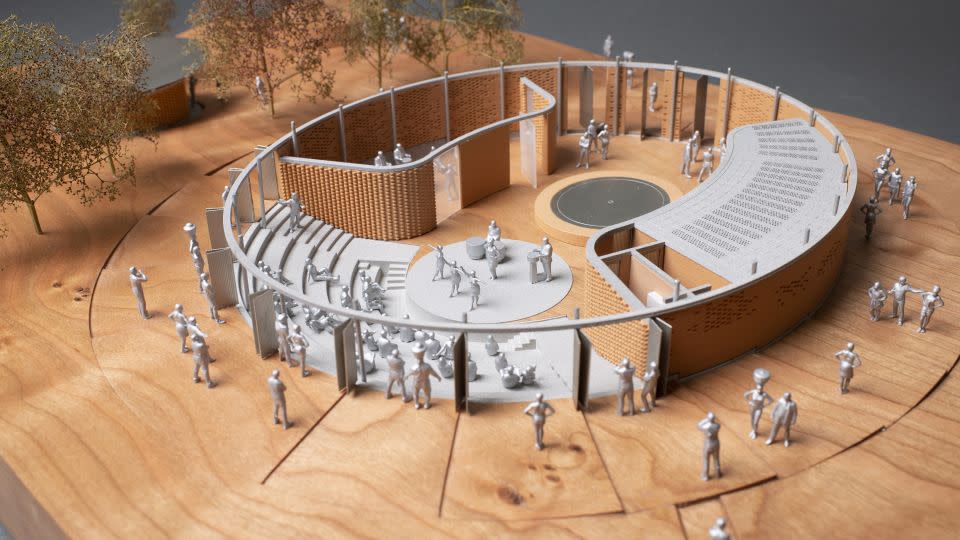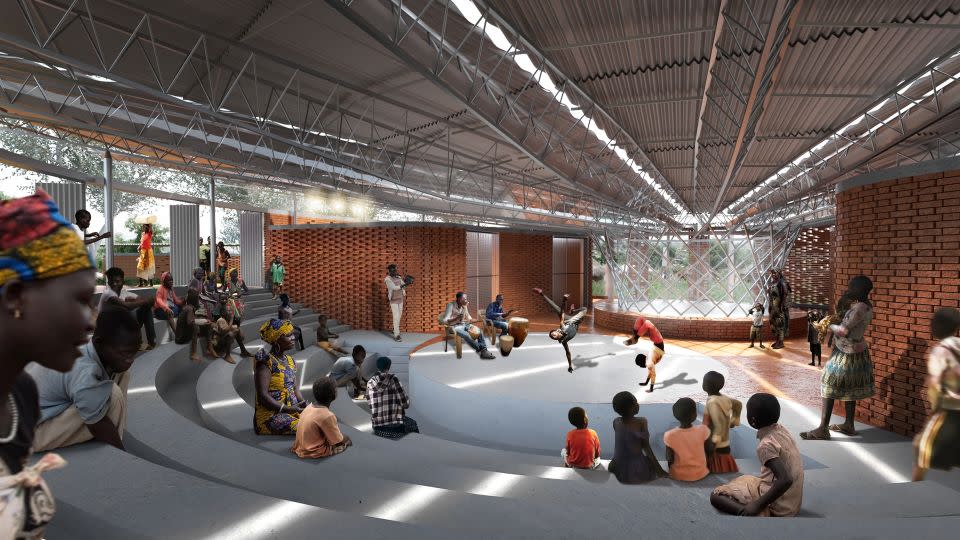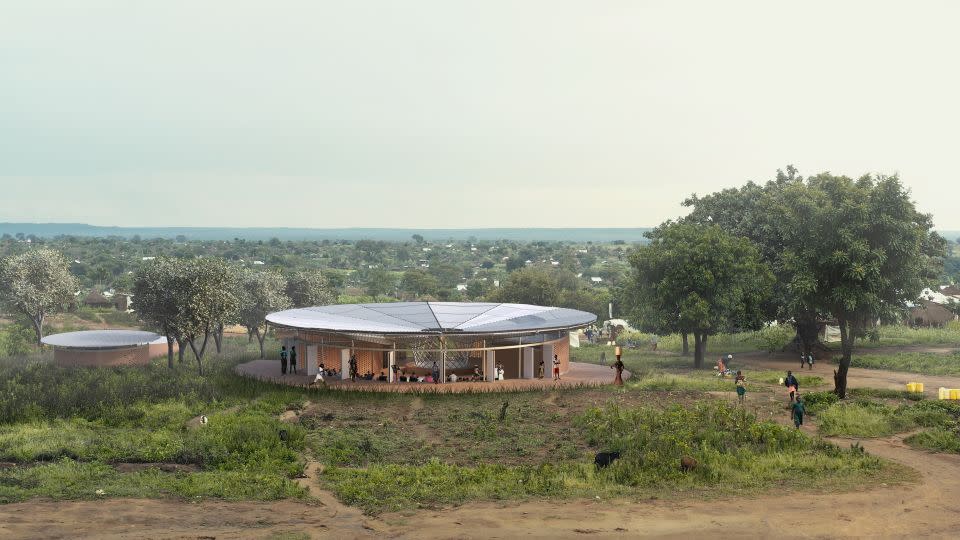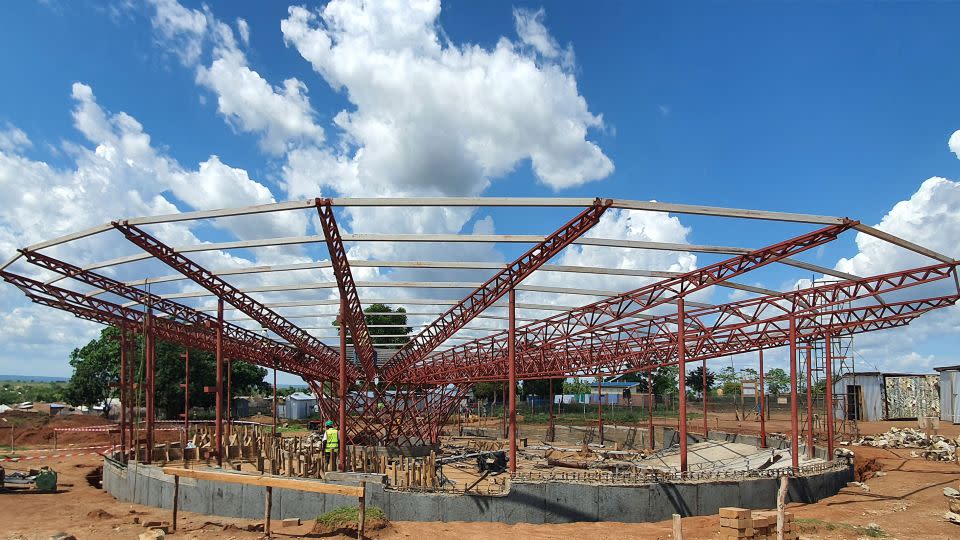One of the world’s largest refugee camps is getting a groundbreaking new arts center
Editor’s Note: Design for Impact is a series spotlighting architectural solutions for communities displaced by the climate crisis, natural disasters and other humanitarian emergencies.
In the arid land outside the Ugandan town of Yumbe, where almost 200,000 refugees have settled in a community known as Bidi Bidi, architects are building the first performance and arts space of its kind.
Over the past seven years, Bidi Bidi has transformed from a rapidly growing camp for refugees fleeing South Sudan’s civil war to a permanent settlement. The Bidi Bidi Music & Arts Centre, which is currently under construction, will be a low-slung, light-filled brick and steel amphitheater that also houses an acoustic recording studio and music classroom.
The center’s sleek steel roof will serve a second purpose, beyond shelter: It is shaped like a funnel to collect rainwater for the local community. A tree nursery and vegetable garden will meanwhile grow outside.
Designed by the architecture firm Hassell and LocalWorks, a design studio based in the Ugandan capital, Kampala, the center is a rare example of an architectural project dedicated to the arts (rather than immediate essentials, like emergency housing and healthcare facilities) in a displaced community. And it could serve as a model for other settlements.

Xavier De Kestelier, global head of design at Hassell, told CNN that he hopes the center will become “a catalyst” for more of its kind. As the global refugee population has soared in recent years, reaching over 35 million in 2022, some temporary camps like Bidi Bidi have transitioned into permanent city-like settlements. With the climate crisis intensifying weather patterns, which can in turn stoke food shortages, the number of refugees worldwide is only expected to grow.
The Bidi Bidi Music & Arts Centre was conceived by the developer To.org, which works with vulnerable communities and displaced people to improve their quality of life. To.org, which works on philanthropic and creative initiatives, surveyed the settlement’s residents on what they wanted in their community — and the response was “a place for dance, music and performance,” explained De Kestelier in a phone call. The project, which was showcased at the London Design Biennale in June, follows the successful launch of another music project by To.org: the Karibbean Records recording studio, in Kyebando, Kampala, which went on to produce Ugandan artist Zex Bilangilangi’s 2020 hit track “Ratata.”

“Why should millions of people worldwide be denied access to creative spaces simply because they have been displaced due to conflict, climate change or for any other reason?” said Nachson Mimran, co-founder and CEO of to.org, in an email. “Of course, the answer is they shouldn’t. And critically, there’s the fact that music, art, dance and theater are firmly established as meaningful forms of therapy for people with PTSD (post-traumatic stress disorder), which is endemic in Bidi Bidi as it is in other refugee settlements.”
‘A powerful tool’
In Bidi Bidi, where the majority of residents are under 18 years old, there is a deep need for shared cultural spaces, according to Mawa Zacharia Erezenio, who has been living in the settlement since its early days, after fleeing South Sudan in 2016 when his father was killed during the civil war.
Residing in the settlement “is not an easy life,” he said. Since arriving, Erezenio has co-founded one of the organizations collaborating on music programming for the center, Sina Loketa, a non-profit dedicated to supporting the creative and entrepreneurial endeavors of young refugees.

One of the difficulties Erezenio faced when he first arrived, he noted, was the simmering tension between displaced members of different tribes. Bringing residents together through the arts “can enable them to start thinking of the future (rather) than fighting among themselves,” he said. “We are bringing different tribes to perform together, and to exchange their cultural dances… We see it as a powerful tool for bringing peace and love among the community.”
“When I compare 2023 to 2016 and ‘17, there’s a great difference,” he added, noting that his organization’s work has already helped reduce the “individualism” he believes has been detrimental to the community.
Sustainable, innovative design
In addition to serving as a gathering point, the new building needs to be as efficient as possible, according to De Kestelier. There is little infrastructure in place to support Bidi Bidi’s massive population, with no running water or reliable electricity supply.
“We wanted the building to be very low maintenance… to make sure that as little as possible can go wrong,” he explained.
To sidestep the need for artificial lighting, sunlight will perforate the brick building through openings and light wells. Its water system doesn’t require pumps, but instead uses gravity, offering another source of clean water to a settlement that currently relies on well water provided by humanitarian agencies and non-profits.
“(Rain) water is captured in a big tank and runs down the slope, where the local community can get fresh drinking water, because that’s been a really big issue,” De Kestelier said. “We wanted to make sure that once we build this big roof for shade, we could capture all of the rainwater.”

In building the space, De Kestelier said the construction team has been sensitive to which materials might be disruptive. They opted for a prefabricated steel roof, made in Kampala, to avoid relying on local wood, the supply of which is under increased pressure because of the large settlement. For the same reason, they opted for hand-pressed bricks made from local soil rather than ones fired using wood fuel.
But beyond practical use and sustainability, De Kestelier wants Bidi Bidi residents to have a new building that feels like their own.
“For me, it was important that it stood out,” he explained, citing his experience growing up in Ghent, Belgium (which has a population roughly equivalent to the settlement’s) and the pride he felt in the city’s cultural institutions. “We have an opera theater, an art museum, a design museum — and these are quite often special buildings that make a place.”
So far, he is happy with the response to the arts center, which will be completed later this year.
“The local community is already calling it ‘The Mushroom,’ which I think is great,” he said with a laugh. “When people give it a name, they own it more.”
Erezenio is hopeful that Bidi Bidi, and other settlements like it, will see more projects that provide refugees with “tools for success” in addition to more immediate needs.
“All their dreams, all their passion has been destroyed during the war,” he said. “If we get more support and more funding, we can make a lot of transformation.”
Correction: A previous version of this story misstated the organizational status of to.org.
For more CNN news and newsletters create an account at CNN.com

